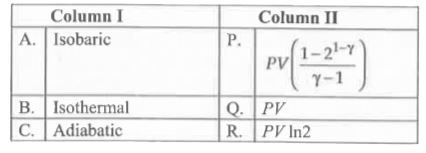are initial pressure and volumes and is final volume of a gas in a thermodynamic process respectively. If constant, then the amount of work done by gas is. Assume same, initial states & same final volume in all processes.
minimum for
minimum for
minimum for
minimum for
The correct Answer is:A
For largen n, pressure will be smaller, so work done will be smaller for larger n.
Topper's Solved these Questions
- KTG & THERMODYNAMICSBOOK - RESONANCECHAPTER - KTG & THERMODYNAMICSEXERCISE - PART -III
25 Videos
- KTG & THERMODYNAMICSBOOK - RESONANCECHAPTER - KTG & THERMODYNAMICSEXERCISE - PART -IV
10 Videos
- KTG & THERMODYNAMICSBOOK - RESONANCECHAPTER - KTG & THERMODYNAMICSEXERCISE - Exercise-2
1 Videos
- KINETIC THEORY OF GASES AND THERMODYNAMICSBOOK - RESONANCECHAPTER - KINETIC THEORY OF GASES AND THERMODYNAMICSEXERCISE - Exercise
64 Videos
- MAGNETIC FIELD AND FORCESBOOK - RESONANCECHAPTER - MAGNETIC FIELD AND FORCESEXERCISE - Exercise
65 Videos
Similar Questions
Pressure and volume of a gas changes from (p0V0) to (p04,2V0) in a process pV2= constant. Find work done by the gas in the given process.
View SolutionAn ideal gas (Cp/Cv=γ) having initial pressure P0 and volume V0 (a) The gas is taken isothermally to a pressure 2P0 and then adiabatically to a pressure 4P0. Find the final volume. (b) The gas is brought back to its initial state. It is adiabatically taken to a pressure 2P0 and then isothermally to a pressure 4P0. Find the final volume.
View Solution
Knowledge Check
An ideal gas at pressure P and volume V is expanded to volume 2V. Column I represents the thermodynamic process used during expansion. Column II represents the work done during processes in the random order.
 AA→Q,B→R,C→PBA→Q,B→P,C→RCA→P,B→Q,C→RDA→R,B→Q,C→P
AA→Q,B→R,C→PBA→Q,B→P,C→RCA→P,B→Q,C→RDA→R,B→Q,C→PThe pressure and volume of a gas are P and V. If its pressure is reduced to P/2, by (A) isothermal process (B) by adiabatic process then the final volume will be :
Amore in ABmore in BCequal in A and BDdepends on the nature of gasThe molar specific heat of an ideal gas at constant pressure and constant volume is Cp and Cv respectively. If R is the universal gas constant and the ratio of Cp to Cv is γ, then Cv.
A1−γ1+γB1+γ1−γCγ−1RDRγ−1
A monatomic gas at a pressure P, having a volume V expands isothermally to a volume 2 V and then adiabatically to a volume 16 V. The final pressure of the gas is ( take γ=53)
View SolutionAssertion: In a thermodynamic process, initial volume of gas is equal to final volume of gas. Work done by gas in this process should be zero
Reason: Work done by gas in isochoric process is zero.
View SolutionA gas undergoes a process in which its pressure p and volume V are related as Vnp = constant.The bulk modulus of the gas in this pressure is
View SolutionInitial pressure and volume of a gas are P and V respectively. First its volume is expanded to 4V by isothermal process and then again its volume makes to be V by adiabatic process then its final pressure is (γ=1.5) -
View SolutionInitial pressure and volume of a gas are P and V respectively. First it is expanded isothermally to volume 4 V and then compressed adiabatically to volume V. The final pressure of gas will be (given γ=32)
View Solution
